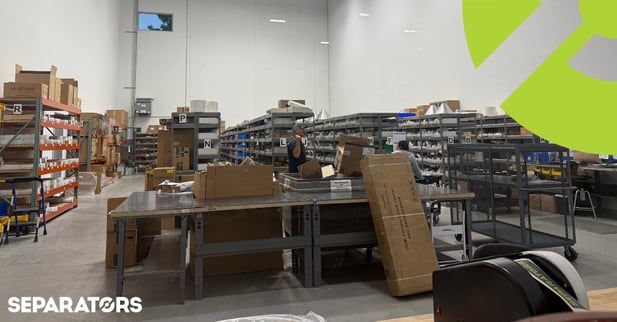Your dairy separator goes down mid-shift. Production stops. You check the parts room, hoping you have what you need — but the shelf is empty. For dairy operations, unexpected downtime disrupts more than just your day. It impacts productivity, profitability, and your ability to meet customer commitments. With tight schedules and perishable products, even minor delays add up quickly.
However, by keeping a few essential components on hand, you can keep production moving when issues arise.
What Should You Keep in Stock?
These components experience constant stress in dairy processing environments and should be kept on hand for replacements.
Gaskets
Gaskets take the brunt of CIP chemical exposure and temperature fluctuations. Keeping a set of high-quality, food-grade gaskets on hand ensures you're ready when leaks or wear occur.
Extra Discs
Damaged or warped discs can throw off balance and reduce separation efficiency. Monitor disc condition closely and maintain spare discs that match your stack configuration.
Minor Service Kit
We recommend keeping a minor service kit on hand for emergencies. When our technicians arrive for emergency service, we'll still ship a kit to your plant as backup. However, we use your on-hand inventory first, and use what is in the new kit to replace what we took from your shelves. This keeps your inventory fresh and ensures you always have parts in good condition for emergency repairs.

Smart Inventory Management
Not all centrifuge operations are created equal. Dairy processing comes with its own unique requirements that must influence your inventory strategy.
Stock Food-Grade Materials
Every stocked part should meet FDA and USDA sanitary standards. Inferior or uncertified materials are a non-starter.
Ensure CIP Compatibility
Parts must withstand the aggressive chemicals and high temperatures used in cleaning cycles. Choose components specifically rated for your cleaning protocols.
Plan for Seasonal Peaks
Many dairy plants ramp up during seasonal peaks. Your inventory strategy should reflect that — stocking more parts during busy periods can prevent backlogs.
Know Your Supplier Lead Times
If your parts supplier can deliver critical components within 24 hours, you can carry less inventory. If lead times stretch to weeks, adjust accordingly. Build relationships with suppliers who understand dairy processing timelines and can respond when you need them.
Maintain Proper Storage Conditions
Climate-controlled storage prevents parts from degrading, especially those sensitive to moisture or chemical exposure. Clean, organized spaces ensure parts remain food-grade compliant. Label everything clearly with part numbers, installation dates, and compatibility information.
Conduct Regular Audits
Quarterly reviews identify what's been used, what's missing, and what needs updating as your equipment or processes change.
Keep Your Operation Running
The reality is simple — keeping a few critical parts on hand can save you from major headaches down the road. A minor service kit, spare gaskets, and a few extra discs don't take up much space or budget — but they can mean the difference between a quick fix and hours of costly downtime. Take stock of what you have, fill the gaps, and rest easier knowing you're covered when something goes wrong.
Need help locating a certain part? Our team can help you troubleshoot and identify the right part you need for your centrifuge.

